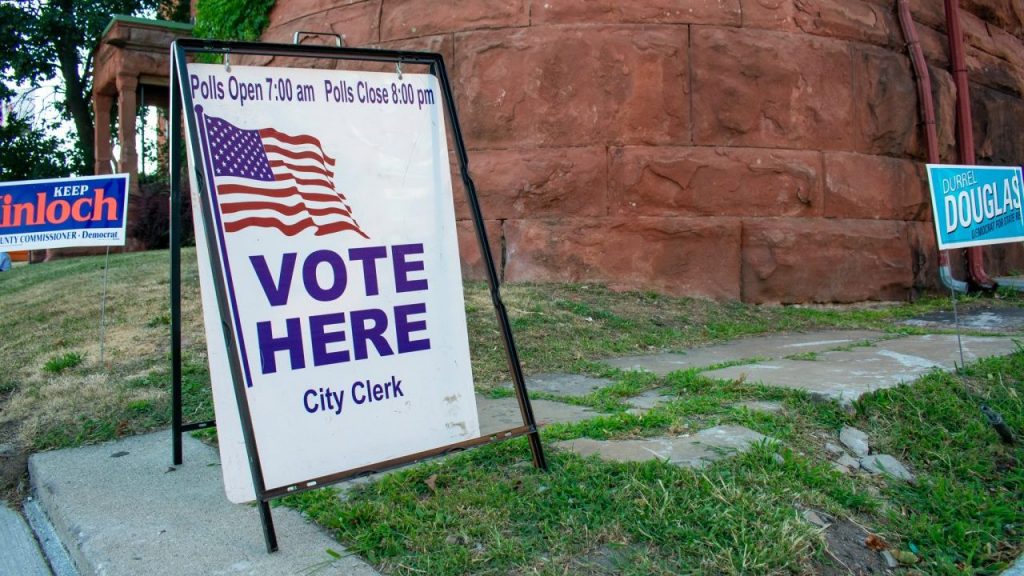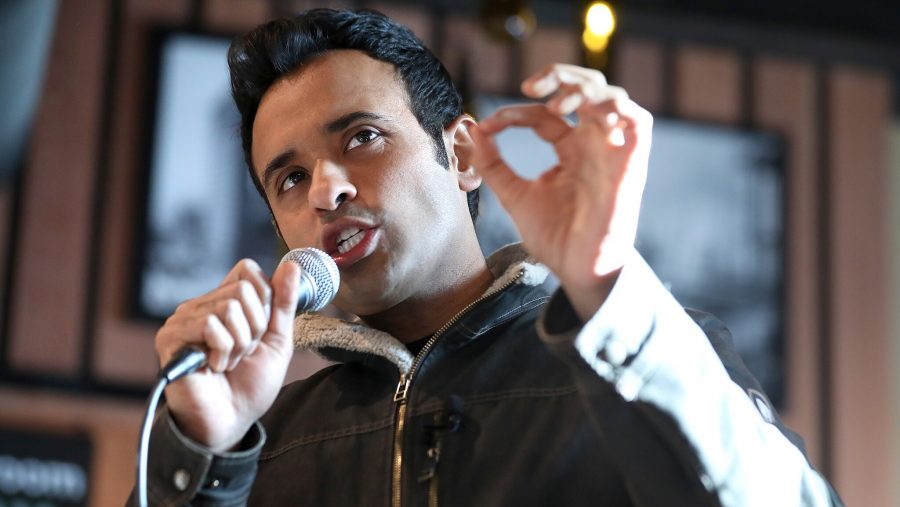Does the presidential primary system reflect the will of the voters?
Despite going earlier in the nominating cycle, Michigan voters, like those in other states, have been left with few viable options on the ballot.

A voting sign advertises First Congregational Church as a place for people to cast their ballots on Tuesday, Aug. 2, 2022, in Detroit.
Michigan moved its presidential primaries to the fourth week of February. Going earlier in the nominating cycle should, in theory, give state residents more viable choices and a greater focus from candidates.
But that hasn’t been the case in 2024. The Republican race is essentially down to Donald Trump and Nikki Haley, while President Joe Biden’s biggest primary challenge comes from Democrats who say they’ll vote uncommitted.
These are the choices that remain for voters after several states already held their primaries and caucuses. Do the results so far defeat the intent of the presidential primary process when several candidates drop out after a small portion of the electorate cast their votes?
Listen: Does the presidential primary system accurately reflect the will of the voters?
Background of presidential primaries
Presidential primary season gives voters a chance to nominate party candidates ahead of November’s general election. Melinda Billingsley, a member of the voting advocacy group Voters Not Politicians, says primaries are a way to bring the voting process to the people “and allow for greater participation among the electorate, which is better for democracy.”
However, the system of primaries has evolved over time — as University of Michigan’s Gerald R. Ford School of Public Policy political scientist and lecturer Jonathan Hanson explained.
“We developed a system where political parties formed, which is something that the Constitution never anticipated,” Hanson said. “And then those parties wanted to nominate a candidate.”
With no guidance from the Founding Fathers, states created their own methods of involving citizens in the process of selecting candidates.
“All told, it’s a very decentralized process,” Hanson said. “Many states have many different ways of choosing these delegates and it’s not a very well-organized system.”
Presidential primary season in 2024
Today there are many different methods utilized by individual states.
Some, like Florida and Pennsylvania, hold closed primaries — where only party registered voters can participate — leaving independent voters on the sidelines. Michigan is one of several states that hold open primaries — allowing anyone to vote on a party’s ticket.
Another method is holding a caucus, where party supporters meet in person to appoint delegates. Billingsley isn’t a fan of the caucus system.
“You have to be at a place at a certain time, you have to stay there for hours and that just is really exclusionary,” Billingsley explains. “And of course, democracy works better the more people are able to participate.”

The Iowa caucuses have been the kick-off event of the nominating cycle since the 1970s, historically serving as the largest filter of candidates before Super Tuesday. This year was no different.
Earlier this month, on a day where the high temperature was below zero, about 110,000 Iowans — in a state of around three million people — left their homes to take part in the Republican caucus. By the time of the New Hampshire primary a few days later, most of the Republican candidates had already dropped out.
Hanson says the outcome means fewer choices for voters in 49 states.
“It’s hard to dispute the fact that giving overriding importance to small states — like Iowa and New Hampshire — creates a process that is really stilted away from the more populace, diverse states,” said Hanson.
What do Michigan voters think?
As the primaries move to Michigan, voters have mixed feelings about their options.
Madeline Duffy — a 20-year-old from Grosse Pointe — will be voting in her very first presidential election this year.
“Personally, I think that there should be more options,” Duffy said. “But on the other hand, you’re still going to have a large chunk of voters who are so dedicated to one candidate that it also kind of screws over the other candidates.”
Claire Van Raaphorst, 31, wouldn’t be against a change.
“Giving the people more of a chance to look at all the slate of candidates would be interesting,” Van Raaphorst said. “But there hasn’t been an appetite to do a lot of interesting things, so I’m not hopeful.”
Should it Change?
While presidential primaries give voters an ever-shrinking list of viable candidates, Hanson believes there is some benefit to the extended races.
“It forces candidates to develop a candidate organization to do a lot of retail politics where they get directly exposed to voters,” Hanson explained.
One way to maintain that element while giving voters more choices could be placing different states together in blocks.
“Maybe not as large as Super Tuesday, but a number of states could all be on one day. And maybe a couple of weeks later move on to another number of states,” said Hanson.
“Don’t let any one state, or two states, always get the privilege of always being first.” — Jonathan Hanson, University of Michigan
At the very least, rotating what state goes first would make sense.
“But don’t let any one state, or two states, always get the privilege of always being first,” Hanson continued. “That doesn’t seem to make sense for selecting a candidate that truly represents the United States well.”
If Billingsley could make a chance to the primaries process, she would be require all states to use the open primary system — just like Michigan.
“Which is important because it means every voter in Michigan has the opportunity to weigh-in on the candidates,” she said.
But when it comes to having a choice of candidates, Billingsley does not think voters should feel unrepresented by a lack of options.
“One thing to remember is that when we look at that primary ballot, there are always choices on it.”
There are seven Republican and three Democratic names printed on Michigan’s February ballot. Even though many of the candidates have dropped out of the race, voters can still select them.
“When those results are released, everyone will be able to see this particular person, for whatever they stood for, got the votes. There was support behind it,” Billingsley said.
Billingsley says voting for someone you believe in is never meaningless — even if that candidate’s viability was left in the Iowa cold.
Trusted, accurate, up-to-date.
WDET strives to make our journalism accessible to everyone. As a public media institution, we maintain our journalistic integrity through independent support from readers like you. If you value WDET as your source of news, music and conversation, please make a gift today.
